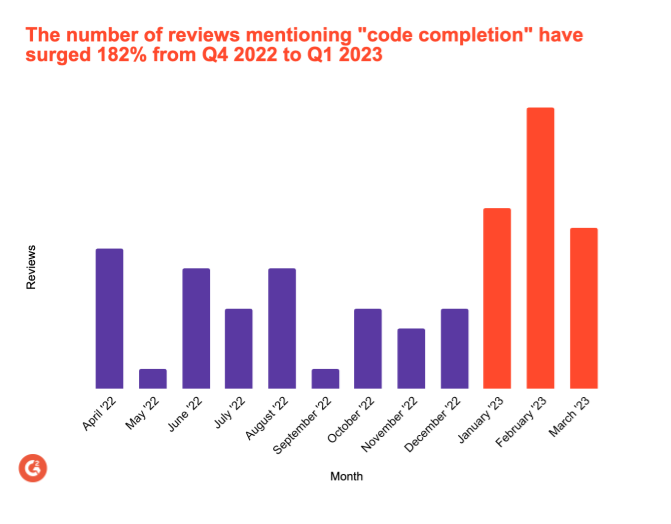Como demostraré con gusto, no hace falta ser un genio para señalar que la inteligencia artificial (IA) es un tema muy, muy candente en este momento. De hecho, los Premios al Mejor Software de 2023 de G2 mostraron que los 3 productos de software de más rápido crecimiento en G2 eran herramientas de IA. Gran parte del revuelo se centra en los chatbots, la categoría de IA de más rápido crecimiento en G2, con un asombroso aumento del 261% en el tráfico entre febrero de 2022 y febrero de 2023.
Sin embargo, el impacto actual y futuro de la IA en el desarrollo de software es una parte importante de la conversación. La finalización de código por IA, un tipo de IA generativa que puede ir desde sugerencias de código de una línea hasta programas completamente funcionales basados en indicaciones sin código, representa un avance para todo el proceso de desarrollo.
El revuelo en torno a la finalización de código
Recientemente, es posible que hayas escuchado a personas decir cosas como "La IA reemplazará a los desarrolladores" o "La IA usurpará a la humanidad y gobernará el mundo a través de una mega red indiferente". Estás por tu cuenta respecto a lo último, pero lo primero no sucederá pronto.
A diferencia de algunas otras formas de IA generativa, como medios sintéticos, la finalización de código no puede pasar de una indicación a un producto terminado sin una supervisión e intervención humana significativa. Por ejemplo, puedes pedirle a un generador de imágenes de IA que haga una imagen de un caballo divertido y terminar con una imagen única que se vea exactamente como debería verse un caballo divertido. Sin embargo, el código generado por IA debe ser verificado contra estándares de seguridad, calidad y cumplimiento antes de que pueda ser utilizado en un entorno de producción.
Debido a que la programación es un proceso complejo e inherentemente creativo, es poco probable que las empresas se sientan cómodas con una IA generando su código sin supervisión.
¿Qué es el Software de IA Generativa?
La IA generativa se refiere a cualquier sistema de IA que pueda producir texto, imágenes y otros resultados basados en indicaciones del usuario. Estos sistemas utilizan datos de entrenamiento como grandes modelos de lenguaje o bases de datos de imágenes para producir resultados únicos que se adhieren a los confines deseados de la indicación.
| Leer más: ¿Qué es la IA Generativa: Medios Sintéticos, LLMs y Más → |
En lugar de centrarse en si la IA podría alguna vez reemplazar verdaderamente a los desarrolladores, quizás sea más útil considerar la IA generativa como un socio durante el proceso de desarrollo. Las herramientas de finalización de código como GitHub Copilot y Amazon CodeWhisperer se posicionan exactamente como eso. Estas herramientas utilizan el aprendizaje automático para producir sugerencias de código y llenar vacíos en el código existente basado en lo que ya está allí.
El resultado es algo mucho menos aterrador que el reemplazo por IA: velocidad. Compass OUL recientemente publicó un estudio que mostró una disminución prevista del 54% en el tiempo que tardan los desarrolladores experimentados en completar tareas al comparar esas tareas sin IA con el probable estado de la IA en 2025.
Esto idealmente permitirá a los desarrolladores (revisa notas) "automatizar tareas tediosas y pasar más tiempo en proyectos complejos". Por supuesto, esa frase ha existido tanto tiempo como low-code, y generalmente no significa nada sustantivo. Creo que la perspectiva de terminar tareas en la mitad del tiempo que solía tomar es un buen punto de discusión.
La finalización de código se menciona más en G2
Ya sabemos que la IA está causando revuelo en G2. Pero, ¿se extiende eso al espacio de desarrollo? Al momento de escribir esto, G2 no ha lanzado su categoría de Finalización de Código por IA, pero al revisar los datos se muestra una clara tendencia.

Desde el cuarto trimestre de 2022 hasta el primer trimestre de 2023, las menciones de finalización de código en todo el sitio de reseñas de G2 han aumentado un 182%. Esto sigue a una disminución general en las menciones durante 2022, por lo que la finalización de código por IA claramente ha vuelto a estar en el centro de atención como parte del reciente revuelo de la IA.
La finalización de código no está exenta de desafíos
Los compradores deben tener precaución al adoptar herramientas de finalización de código. La velocidad y la eficiencia siempre son excelentes, especialmente bajo la supervisión de un desarrollador experimentado. Pero este es un espacio de rápido crecimiento, con herramientas como Einstein GPT de Salesforce, recientemente presentado, capaces de generar más y más código con solo una indicación o unos pocos parámetros.
A medida que los no desarrolladores adquieren la capacidad de fabricar más líneas de código sin saber cómo funciona realmente ese código, surgen preguntas serias.
¿Cómo impactará esto en el seguimiento de errores? Sin un autor real a quien acudir cuando inevitablemente algo se rompa, el proceso de depuración puede ralentizarse de una manera que compense significativamente los beneficios de la finalización de código. El cumplimiento de la seguridad también es una preocupación significativa; las herramientas de finalización de código deben ser capaces de garantizar estándares de seguridad de primera clase para evitar pesadillas de ciberseguridad.
Mirando hacia adelante
La tendencia de la IA es emocionante, aterradora y quizás incluso un poco molesta, dependiendo de a quién le preguntes. En el mundo del desarrollo de software, la gente ya ha comenzado a cuestionar si los trabajos de los desarrolladores están en peligro en el futuro cercano debido a la IA generativa.
El resultado más probable, sin embargo, es que la finalización de código continuará sirviendo como un gran beneficio para la productividad de los desarrolladores. En lugar de que sus trabajos sean reemplazados, los desarrolladores se encontrarán mejor equipados para hacer su trabajo.
Si bien todas las ventajas vienen con preocupaciones, solo el tiempo dirá si la innovación en este espacio superará la capacidad de las empresas para evitar grandes dolores de cabeza de depuración y seguridad. Esté atento a la categoría de Finalización de Código por IA de G2, que se lanzará pronto, para seguir de cerca este espacio.
Editado por Shanti S Nair
¿Quieres aprender más sobre Software de IA Generativa? Explora los productos de Inteligencia Artificial Generativa.

Adam Crivello
Adam is a research analyst focused on dev software. He started at G2 in July 2019 and leverages his background in comedy writing and coding to provide engaging, informative research content while building his software expertise. In his free time he enjoys cooking, playing video games, writing and performing comedy, and avoiding sports talk.
